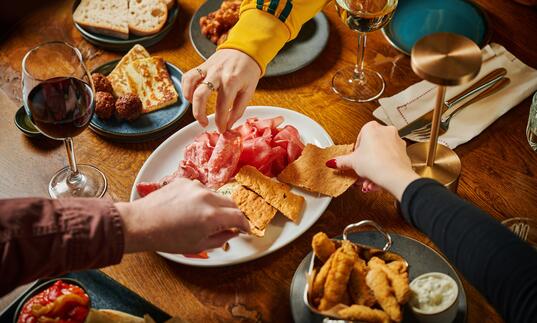LHASA
Start time: 8pm
Running time: approximately 100 minutes, no interval
Please note all timings are approximate and subject to change

Martin Aston talks to Mira Tindle, Mélissa Laveaux and Andrew Barr about remembering an artist who pushed the expectations of her music.
‘Lhasa was a bruja – a witch. A real one. Maybe even the kind that never even trained.’
Mélissa Laveaux’s evocative description of Lhasa de Sela nails the essence of the late Mexican-American singer-songwriter, whose elemental and passionate music is celebrated at the Barbican with a special tribute.
The show was first staged at 2018’s PEOPLE festival in Berlin, performed by friends and collaborators who were as transfixed by Lhasa as the worldwide audiences that flocked to see her. At the Barbican, a stellar line-up of Mira Tindle, Mélissa Laveaux, Leslie Feist, Bryce Dessner, Andrew Barr, Clarice Jensen, Dustin O'Halloran, Emma Broughton, Joel Shearer and Todd Dahlhoff will interpret songs from her three albums, La Llorona (1997), The Living Road (2003) and Lhasa (2009), the last released less than a year before she died from breast cancer, at the age of 37.
Mostly known by her first name, Lhasa was a particular talent, a caster of spells with a gorgeously sultry, haunting voice and intimate declarations of love, loss and mystery. She sung in English, Spanish and French over a blend of South and North American folk and country (especially Mexican ranchera) with traces of gospel, chanson, Middle Eastern, Romany, klezmer and AOR, Lhasa tapped a wide range of emotion, from anguish and vulnerability to hope and pride. For Mina Tindle, the French folk and new wave singer-songwriter and multi-instrumentalist who conceived this tribute, Lhasa was a great inspiration as well as a source of comfort.
As Tindle recalls, PEOPLE had asked her to curate a one-off event for their 2018 festival. ‘My husband [Bryce Dessner] and I had had a baby, and I’d been listening to music that was suitable for a new-born, and I realised I’d played Lhasa the whole year: her voice is so warm and soothing and pure,’ she says. ‘It has the same effect on me as Nina Simone, using music as a way to speak the truth. I wanted to sing these songs with whoever also wanted to: I first asked Leslie Feist, who said yes right away. In fact, everyone I asked said yes without asking questions!’
Haitian-Canadian singer-songwriter Mélissa Laveaux was sold on Lhasa from the moment she heard La Llorona. ‘Her music was fresh, organic and melodramatic, and the lyrics were the type to make you beat your chest as you sang along to lyrics about crying, head facing the wall as a city burns down,’ she recalls. ‘Lhasa’s work taught me you don't have to sing in English to have your voice heard, that you weren’t automatically dumped in the vague and sometimes nonsensical ‘world music’ category. She also taught me that you can make your own category or box, and to push the walls to make that box bigger as you grow as an artist.’
Lhasa’s ability to ignore boundaries lies in her DNA and upbringing. She was born in the hamlet of Big Indian in the Catskills region of upstate New York, to a Mexican father (language instructor Alejandro Sela) and an American mother (photographer/actress Alexandra Karam). Her paternal grandmother was Panamanian pianist Carmen de Obarrio; her Lebanese great-grandfather sang in six languages. After an itinerant childhood in Mexico and the US, Lhasa’s parents divorced and her mother took her children to live San Francisco, a suitable melting pot for culture, languages and open minds. A Billie Holiday documentary convinced the teenage Lhasa that singing was her destiny.
In 1991, Lhasa visited her sisters in Montreal and made the city her home, where she performed in bars, learning, ‘how to reach people, even people who were there for beer and conversation,’ she said. After releasing La Llorona, an all-Spanish album (named after the Legend of La Llorona, ‘the weeping woman’), Lhasa toured Europe and America with the all-female Lilith Fair collective. She later joined her sisters in the French circus/theatre company Pochéros. and settled in Marseille before returning to Montreal to record The Living Road, adding English and French to her Spanish lyrics.
By 2007, ‘she was ready to try something different,’ according to drummer Andrew Barr, who subsequently joined Lhasa’s band. ‘Lhasa had written new songs in English, and the lyrics conjured up different sounds,’ he says. ‘For example, there was a pedal steel player and upright bass with jazz influences. With Lhasa, it felt like you were somehow stepping into an older world. She had this smiling-with-her-mouth and crying-with-her-eyes look, and she was very captivating to be around. The smaller details of life seemed really important to her, which brought that out in you. It was the voice of a storyteller: from the minute you heard a song, you wanted to know where it was going. Later, you realised the melody was there so that you could sing it back to your friends.’
Lhasa’s self-titled English-language album appears to have been a determined effort to broaden her audience. But between recording and releasing Lhasa, she received her cancer diagnosis, and only performed a handful of shows afterwards, including the posthumously released Live In Reykjavik. As the album shows, despite her illness, Lhasa remained spellbinding on stage, and it’s this spirit of resilience and beauty that this tribute show is built on.
‘When we get together to play these songs, my spirit gets tipsy and I move differently,’ says Laveaux. ‘Ten years after her passing, Lhasa’s music still lifts. I hope we can set even a fraction of the intention she would set to her performances and to let people know about the kind of fire she gave us to work with.’
Produced by Sounds from a Safe Harbour. Presented by the Barbican.
Start time: 8pm
Running time: approximately 100 minutes, no interval
Please note all timings are approximate and subject to change
Performers
Andrew Barr drums
Emma Boughton vocals
Todd Dahlhoff guitar
Pauline DeLassus vocals
Bryce Dessner guitar
Leslie Feist guitar, vocals
La Force vocals
Clarice Jensen cello
Melissa Laveaux vocals
Alexi Murdoch vocals
Dustin O'Halloran piano
Joel Shearer guitar
Eat & drink
Discover

Watch: LHASA tribute In the Studio
Watch Mina Tindle, Leslie Feist, Emma Broughton, Clarice Jensen, Melissa Laveaux, Bryce Dessner, Andrew Barr, Todd Dahlhoff, Shahzad Ismaily, Dustin O'Halloran, Joel Shearer rehearsing their tribute to late Canadian singer Lhasa de Sela.

Barbican Sessions: Shabaka Hutchings
For our latest Barbican Session, one of the central figures of the London jazz scene, Shabaka Hutchings performs an improvised piece on bass clarinet.
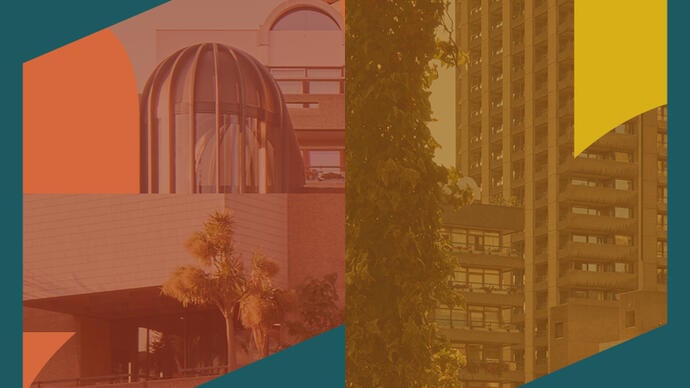
Listen: Barbican Recommends
Not sure what to listen to? Every month we update our Barbican Recommends Spotify playlist with what we've been listening to in the office. Expect everything from Punk to Jungle to Classical.
You also might like...
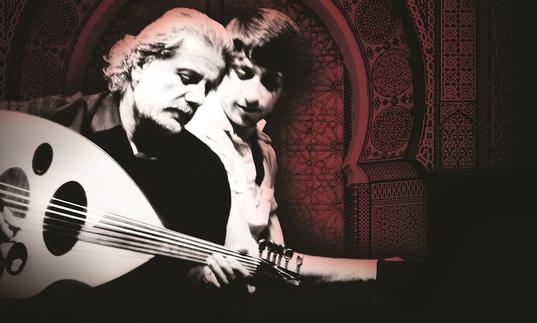
featuring Aymeric Westrich
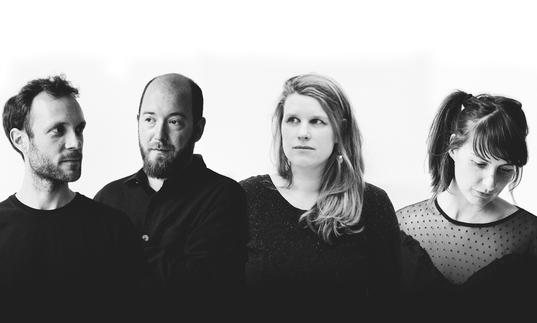
+ Félicia Atkinson
Barbican Hall
Location
The Barbican Hall is located within the main Barbican building. Head to Level G and follow the signs to find your seating level.
Address
Barbican Centre
Silk Street, London
EC2Y 8DS
Public transport
The Barbican is widely accessible by bus, tube, train and by foot or bicycle. Plan your journey and find more route information in ‘Your Visit’ or book your car parking space in advance.
We’ve plenty of places for you to relax and replenish, from coffee and cake to wood-fired pizzas and full pre-theatre menus
Mobility
Spaces for wheelchair users in row U at the rear of the stalls (up to sixteen, depth of row 180cm) and the back row of the circle (four), both with fold-down companion seats. Some seats in row S of the stalls for people with very limited mobility.
Assistance dogs
Assistance dogs may be taken into the concert hall where there are a limited number of suitable seats in row G of the stalls. If you prefer, you may leave your dog with a member of the cloakroom staff during the performance.
Hearing facility
There is an induction loop in the concert hall. You can use this by adjusting your hearing aid to the ‘T’ setting.
Free large-print programmes
These are available for most of our concerts. Please contact access@barbican.org.uk at least a week beforehand, to prebook a large-print programmme.
For more access information, please visit our Accessibility section.
Plan your visit
Meet friends, grab a drink, drop in to one of the free installations on Level G before the show - here's what else is happening at the Barbican when you visit.
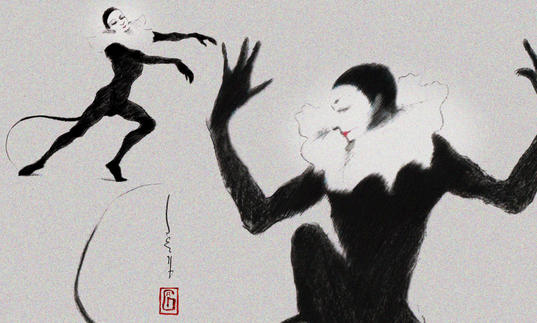
A Barbican Music Library Exhibition

